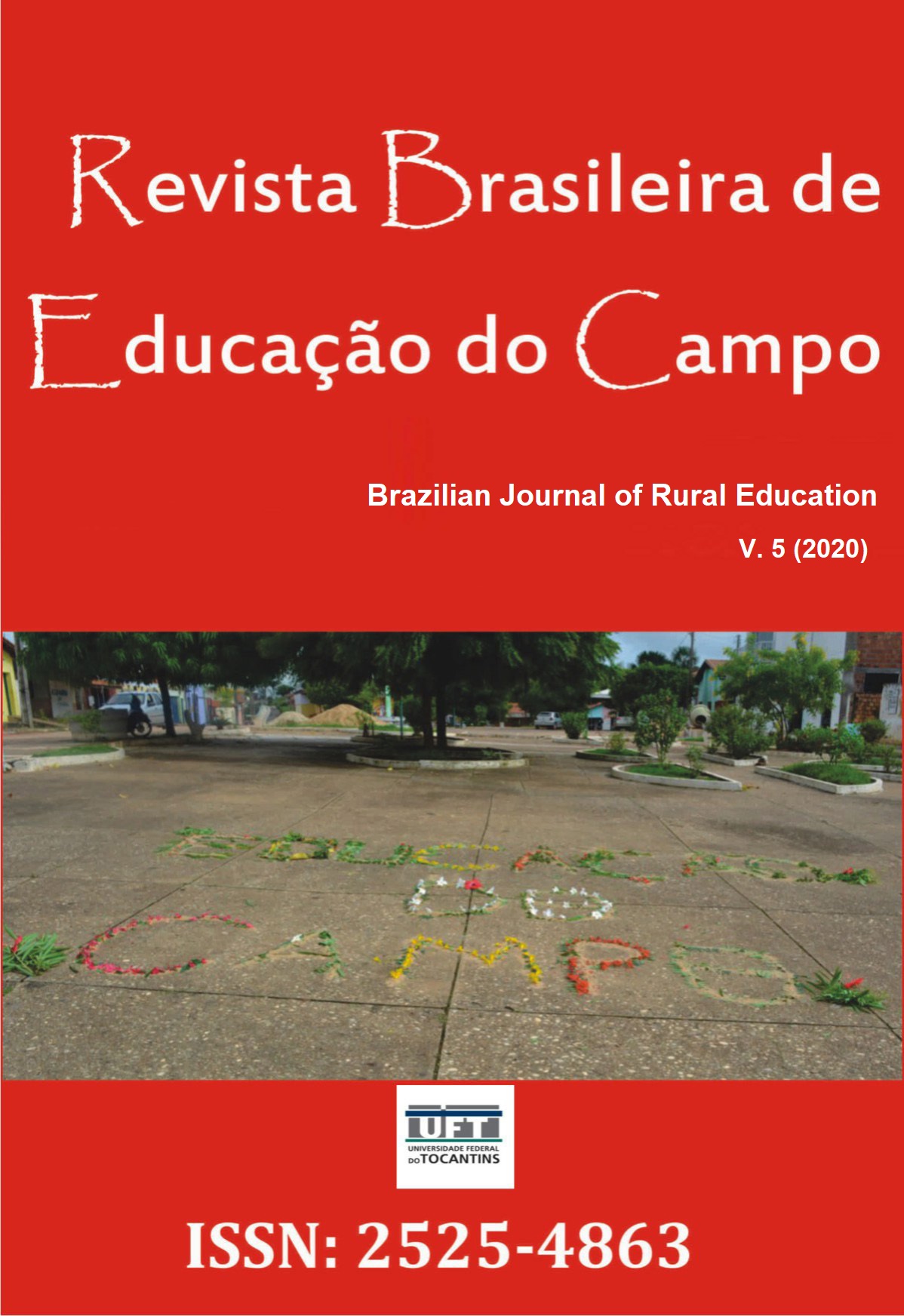Education of the Movement of Landless Rural Workers: a space of resistance to coloniality and its mechanisms of power
DOI :
https://doi.org/10.20873/uft.rbec.e7162Mots-clés :
Rural Education, MST’s Education, Coloniality.Résumé
ABSTRACT. This paper is part of an investigation linked to the Post-graduate Education Program in the Federal University of Mato Grosso, research on Social Movements, Politics and Popular Education, Cuiabá, with the support of the Coordination for the Improvement of Higher Education Personnel (CAPES). Its purpose is to analyze the pedagogical and educational initiatives developed in rural schools, under the coordination of the Movement of Landless Workers (MST) in Mato Grosso, as a process of resistance to coloniality and its mechanisms of power. This is a qualitative research, developed with the teachers and directors of the Florestan Fernandes National School located in the October 12’s Settlement. The research tools used were: semi structured interviews, participant observation and field journals. Based on the interviews, it can be seen that the MST’s schools are constituted from an anti-hegemonic conception, with different pedagogical practices. The field journals analysis reveals that this school implements the philosophical and pedagogical principles of the Movement, although financed by the public sector.
Téléchargements
Références
Agostini, A. (2011). Escola e movimento social: a experiência em curso no campo brasileiro. In Vendramil, C. (Org.) A importância e a necessidade da teoria para a construção da escola do MST (pp. s./p.) São Pablo. Expressão Popular.
Caldart, R. (2012). Pedagogia do Movimento Sem Terra. São Pablo. Expressão Popular.
Caldart, R. (2001). O MST e a formação dos sem terra: o movimento social como princípio educativo. São Paulo. Revista Estudos Avançados, 15(43), 207-224. https://doi.org/10.1590/S0103-40142001000300016
Escola Estadual Florestan Fernandes. (2019). Projeto Político Pedagógico. Mato Grosso.
Fals, O. (1998). Investigación Acción Participativa -aportes y desafíos. Bogotá. Dimensión educativa.
Freire, P. (1997). Pedagogia do oprimido. Rio de Janeiro, RJ: Paz e terra.
Freire, P. (1996). Pedagogia da autonomia São Pablo. Paz e terra.
Mészáros, I. (2005). A educação para além do capital. São Pablo. Boitempo.
Molina, M. (2006). Educação do campo e pesquisa: questões para reflexão. Brasília. Ministério do Desenvolvimento Agrário.
Morissawa, M. (2001). A História da luta pela terra e o MST. São Pablo. Expressão Popular.
MST - Movimento dos Trabalhadores Rurais Sem Terra. (1996). Caderno de Educação n°8: Princípios da educação no MST. São Paulo.
MST - Movimento dos Trabalhadores Rurais Sem Terra. (2001). Boletim de Educação n°8: Acompanhamento às escolas do MST. São Paulo.
Parra, R. (1986). Escuela y modernidad: la escuela rural Colombia. Bogotá. Fundación Restrepo Barco.
Pinheiro, L. (2015). Educación, resistencia y movimientos sociales: la praxis educativo-política de los Sin Tierra y de los Zapatistas. Universidad Nacional Autónoma de México.
Quijano, A. (2007). El giro decolonial: reflexiones para una diversidad epistémica más allá del capitalismo global. In Grosfoguel, R. (Org.). Colonialidad del poder y clasificación social (pp. 93-126). Bogotá. Pontificia Universidad Javeriana, Instituto Pensar.
Sader, E. (2005). Prefácio: A educação para além do capital. São Pablo. Boitempo.
Santos, A. P. (2016). Significações do currículo da educação infantil do/no campo para a comunidade escolar de um assentamento de reforma agrária na região norte de mato grosso (Dissertação de Mestrado). Universidade do Estado de Mato Grosso, Campo Grande.
Sirvent. M. (2018). De la Educación Popular a la Investigación Acción Participativa. Perspectiva pedagógica y validación de sus experiencias. Revista InterCambios. Dilemas y transiciones de la Educación Superior, 5(1), 12-29.
Solano, A. (2015). Descolonizar la educación o el desafío de recorrer un camino diferente. Revista Eletronic@ Educare, 19(1), 117-129. https://doi.org/10.15359/ree.19-1.7
Supremo Tribunal Federal. (2019). Constituição da República Federativa do Brasil de 1988. Brasília. Recuperado de: https://www.stf.jus.br/arquivo/cms/legislacaoConstituicao/anexo/CF.pdf.
Sousa, M. I. (2014). Do desbravar ao cuidar: interdependências trabalho-educação no/do campo e a Amazônia mato-grossense (Tese de Doutorado). Universidade Federal do Rio Grande do Sul, Porto Alegre.
Stedile, J. (2012). Brava gente: a trajetória do MST e a luta pela terra no Brasil. São Pablo. Expressão Popular.
Torres, J. (1998). El curriculum oculto. Madrid. Morata.
Walsh, C. (2013). Pedagogías Decoloniales: Prácticas insurgentes de resistir, (re)existir y (re)vivir. Tomo I. Quito. Ediciones Abya-Yala.
Zibechi, R. (2015). Descolonizar el pensamiento crítico y las practicas emancipatórias. Bogotá. Desde Abajo.
Téléchargements
Publié-e
Comment citer
Numéro
Rubrique
Licence
Proposal for Copyright Notice Creative Commons
1. Policy Proposal to Open Access Journals
Authors who publish with this journal agree to the following terms:
A. Authors retain copyright and grant the journal right of first publication with the work simultaneously licensed under the Creative Commons Attribution License that allows sharing the work with recognition of its initial publication in this journal.
B. Authors are able to take on additional contracts separately, non-exclusive distribution of the version of the paper published in this journal (ex .: publish in institutional repository or as a book), with an acknowledgment of its initial publication in this journal.
C. Authors are permitted and encouraged to post their work online (eg .: in institutional repositories or on their website) at any point before or during the editorial process, as it can lead to productive exchanges, as well as increase the impact and the citation of published work (See the Effect of Open Access).














